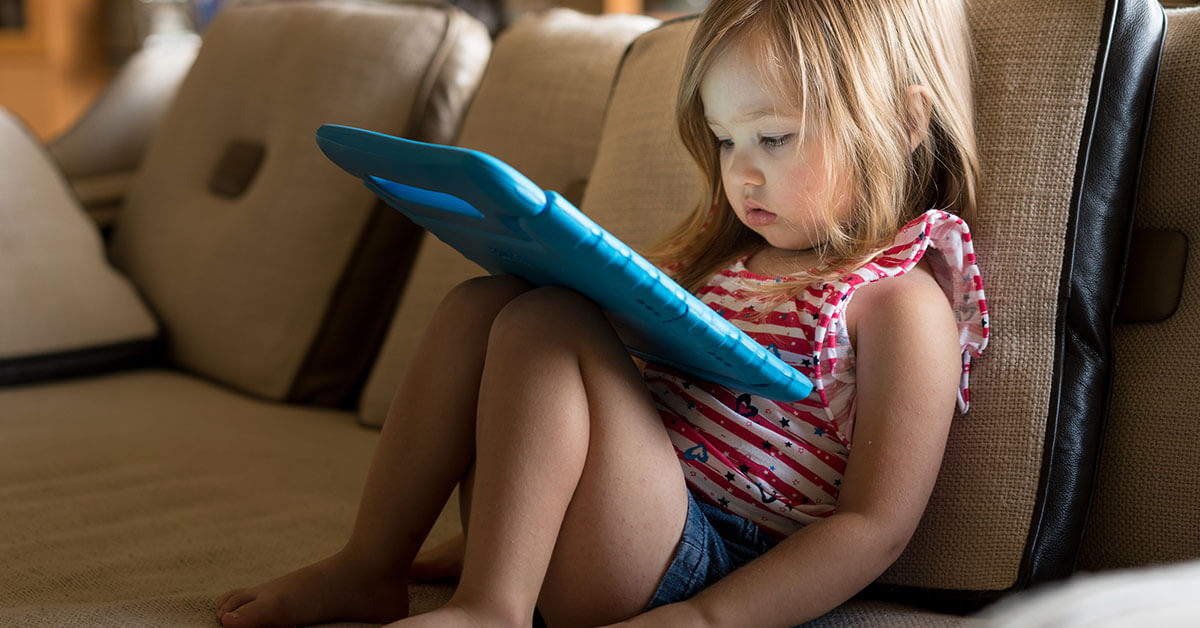Screens are everywhere these days. Your child is exposed to them all day long. As parents, it can be difficult to limit your child’s exposure to media, but the benefits of limiting screen time for kids are worth the effort. Here are some tips to get you started on making a plan to limit your family’s screen time.
1. Learn Why Limiting Screen Time for Kids is Important
When creating rules for screen time, it’s helpful for both you and your kids to know why they should follow them. Limiting screen time is crucial for your child’s health in several ways. Spending too much time using media (television, computers, phones, other screens) is bad for mental, behavioral, and physical health. According to the American Academy of Pediatrics, excessive screen time or media use is linked to:
- Obesity
- Lack of sleep
- Aggression
- Behavioral issues
- Problems at school
2. Find Out How Much is Too Much
Experts across the board agree that screen time for kids should be limited to two hours a day. This applies to “media use” rather than time spent at school learning on the Smartboard or doing homework on the computer. Media use includes watching TV, spending time on social media, gaming, texting and messaging, or other digital activities.
3. Make a Plan for the Whole Family
Once you know the right limits to set for screen time for your kids, it’s important to make a plan. Talk to kids about what shows they want to watch and which games they want to play. Agree on what they can watch and play and for how long. After the show is over or their scheduled time is over, turn off the TV or device. And it’s important for the entire family to be on the same plan no matter their age. As parents, modeling healthy behavior is important. The American Academy of Pediatrics has a guide for making a Family Media Use Plan on their site for parents.
4. Schedule Regular Screen-Free Time
Just like screen time for kids should be scheduled, make a point to schedule screen-free time. However, you do not have to limit this time. Use it to get outside and get active. A good rule is for kids to spend as much time active as they do with screens. It’s also a good idea to schedule a screen-free time before bed, even for older children. It’s recommended that screen use be stopped at least an hour before bed.
5. Keep Track of Screen Time
Keep track of how much screen time your family has each day by writing it down each day. Log each family member’s time, including yours. This is useful for several reasons. You’ll be able to see how much time you’re spending looking at screens so you can make adjustments and improvements. It doesn’t have to be a formal or involved process unless you want to make it one as part of your family plan. You can just keep a running list on a notepad. Hold onto these notes to see how you’re progressing week to week or month to month.
6. No TV or Computers in the Bedroom
Doctors and other experts emphasize the importance of keeping screens out of the bedroom. Make a rule that no computers, no television, no tablets, and no phones are allowed in their rooms. This rule can become more difficult to enforce as children get older and want more independence with their devices and need computers more and more for schoolwork. However, it’s an important rule to maintain. Keeping a device curfew as mentioned earlier is a good idea even for older kids.
7. Keep Screens Off During Activities
Many of us have fallen into the habit of keeping the TV on in the background during activities that don’t require our full attention. Having a show or movie on in the background may seem harmless, but it is still a distraction and would count towards total screen time. That means switching them off during homework time, chores, and meals. Even if it is during scheduled screen time, kids should not be allowed to eat in front of the computer or TV. Mindless snacking becomes a problem when kids are not paying attention to what they’re eating.
8. Lead by Example
Again, you can’t just talk the talk when it comes to limiting screen time. You need to walk the walk. Decrease your own screen time to two hours a day outside of work. You might need to be at your computer most of the day, but you can limit your own social media use, television time, and other digital activity.
At Carithers Pediatric Group, we know that many factors contribute to your child’s physical, mental, and emotional health. We offer comprehensive care to children from birth through the college years. If you have questions about how screen time can affect your child’s health, call our Riverside office at (904) 387-6200 or our Southside office at (904) 997-0023 to make an appointment.



